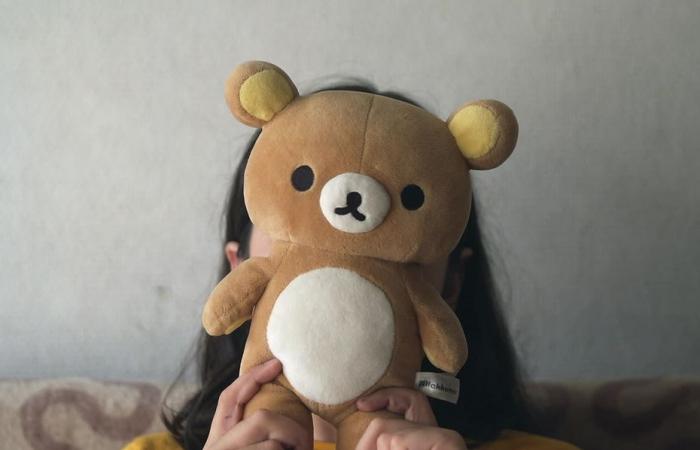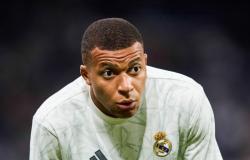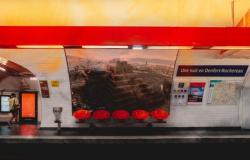
“There were only grown-ups, there was only me.” Kosta, Ania and their families left a part of themselves, petrified, in the detention center where they were locked up. The documentary by Noémie Ninnin and Selim Benzeghia opens up a part of a reality that is often ignored.
Company
From daily life to major issues, discover the subjects that make up local society, such as justice, education, health and family.
France Télévisions uses your email address to send you the “Society” newsletter. You can unsubscribe at any time via the link at the bottom of this newsletter. Our privacy policy
Kosta was only eight years old when he walked through the doors of a detention center and they closed behind him. Since then, he has grown up, as best he could, with his wounds and traumas sticking to his skin and sealing his lips. He draws the plans of his confinement on the ground, kept in memory like a residual nail in the middle of a deserted living room.
His mother Mia takes over and recounts everything she experienced through him.
Ania, for her part, just an adult at the time of the events, testifies for her little sisters and her little brother, for her parents and for herself, having too quickly taken on fears and responsibilities disproportionate for her age.
Kosta, his mother Mia and his father Noukri had to leave their country, Georgia, because they were threatened with death. They arrived in France, in Paris, on July 17, 2019. Kosta was over the moon; his parents had told him that they would be welcomed by friends and that he would be able to get into a good school very quickly. He was happy. After passing a test, he joined a CE1 class, where he had an extraordinary teacher. Thanks to his support, Kosta learned French very quickly. In a month, he is already speaking.
Mia took steps to apply for asylum on July 17. On January 21, the answer came like a hammer. At the beginning of March, they received the order to leave the territory.
Under house arrest, the small family must go to the police station every day to sign a document. Kosta, despite his young age, has the same obligations. He undergoes this daily constraint, every day after school and even on weekends.
“Residence arrest (…) requires you to stay in a specific place. It aims to ensure your surveillance. It can be imposed for a short period (45 days) or for a long period (6 months).” Source: Official website of the French administration.
•
© Photo from the documentary
The little boy asks questions that shouldn't be his age and certainly holds back so many more. He wonders what they did wrong, did his parents hide something from him? In his little head everything is jostling.
On the 46th day, the policeman closed the door and said to them: “You will be deported tomorrow, so today we will transfer you to the detention center.” Kosta starts to cry.
Kosta is locked up
Arriving at the detention center, the small family is searched: Noukri by a man, Kosta and his mother by a woman. What can a little boy imagine when someone's pockets are picked? Will they accuse him of stealing something? If he did nothing, who did anything stupid to deserve such punishment?
Kosta and his parents are searched upon arrival at the detention center
•
© Photo from the documentary
The Metz CRA can accommodate 98 people, mainly men. Taken to the women and families area, Kosta and his parents spread the mattresses of the two beds in the room on the floor to get closer and find comfort.
Kosta is the only child here; he has no friends his age and doesn't know what to do. He would like to draw, but pencils are forbidden in the room. So he watches TV all day. Sometimes he goes out to the playground, but it rains a lot.
Meals are served at a fixed time, between two snacks. Kosta's stomach rumbles. His dad wraps small pieces of bread in a napkin for his son. Seven hours without eating is a long time, especially when you have nothing to do. If the days are long, the nights are short.
Every morning and every evening, four or five police officers carry out a check, enter the room making noise. Kosta wakes up with a start.
Kosta wakes up with a start in the early morning
•
© Photo from the documentary
Kosta's shoes are torn, as is his little child's heart. A young police officer who works from time to time at the detention center brings them everything they need to change and even slips money from her pocket to help them.
Cost of the Tribunal
Kosta's parents refuse to board the first time. They are therefore brought back to the detention center before being presented before a judge. In court, surrounded by police, Kosta is so scared that he pees on himself.
Cost of the Tribunal
•
© Photo from the documentary –
No one can do anything for him, now is not the time. His mom and dad do what they can to keep him away from prying eyes and from shame.
Kosta must go
On the 14th day, the prefecture orders the expulsion again. They must leave immediately. Kosta's mother can't bring herself to do it. Mia and Noukri are handcuffed at the hands and ankles, facing Kosta's frightened gaze.
Kosta became hysterical, he didn't want to get on the plane. He said: “I don't want to go to Georgia.”, he begged the police.
•
© Photo from the documentary
They only stayed a few days in Georgia, where they were in danger, before finding refuge in Türkiye, their only escape.
Over time, Kosta withdraws into himself, afraid of being expelled again. He has nightmares, night terrors, and screams in the night.
duration of video: 00h02mn03s
The after-effects of confinement in children
•
©France televisions
He would like to return to France, find his school and his friends. The silence invades him a little more each day, and he no longer communicates with his parents as before. Childhood is gone.
Ania, now 25 years old, arrived in France with her family in 2012.
Suddenly, her father decided to flee Albania when she was 15 years old. This decision turns her life upside down, leading her to leave her country, her friends and her landmarks for a new environment that she must get to grips with.
As the eldest, she feels a responsibility towards her two little sisters and her 4-year-old brother, all of whom are in school. After two years of effort, Ania managed to obtain her French baccalaureate. However, the happiness is short-lived: his parents' request for asylum is refused. One month later, they received an OQTF, the decision requiring them to leave the territory.
Like Kosta, Ania doesn't understand why she has to leave France, when they have done nothing. The fear of being arrested one day is a very heavy sword of Damocles to bear for the teenager. Protecting the little ones is a mission that she takes on silently.
The carefree nature of her age escapes her, and she feels more and more different from others.
Ania has just turned 18. Her little sister is 15, the other is 12, and her brother is 7. It was summer, vacation. His father went out to play with the youngest. Around 11 a.m., a knock sounded at the door: two police officers, followed by around twenty people, entered the apartment. In the absence of her husband, her mother is disoriented, and it is Ania who takes matters into her own hands.
Ania opens the door to the police, her mother is paralyzed
•
© Photo from the documentary –
The agents present him with papers and announce that they need to prepare their things, that they are coming to pick them up to take them to a detention center. When they ask where her father is, Ania replies that he is out. They easily find him in this small village.
To this day, Ania wonders if she made a mistake in revealing his presence, even though she knows she did her best in a desperate situation.
His dad is arrested in the village
•
© Photo from the documentary
Ania has the impression that the place of arrest is full of people. The village mayor is the only one to shake his father's hand, tears sliding down his cheeks.
Arriving at the detention center, their personal items are carefully checked. They are given permission to keep their phones, provided they do not have a camera… They will therefore all be confiscated. One of her little sisters manages to hide hers, Ania uses it to call everyone she knows and ask for help.
“According to the law, foreigners must only be locked up in a detention center for the time strictly necessary for their departure. This is a transitional measure while waiting for the next available flights.”
Ania and her family will spend one night there.
duration of video: 00h01mn22s
The damage is done, however long it lasts.
•
©France televisions
The young girl feels like she is living a nightmare, she would like to wake up and have everything go back to the way it was before, but this is her reality. Fear, rage, anger mingle and collide to the rhythm of anguish, despair and helplessness.
The key turns in the lock, and an old man tells Ania that the plane will leave with them today and that they should take it “like a vacation.” “Like a vacation!” »
His mother is present, but she seems absent. On the plane, they are all separated.
It was just us, our family, and the police who accompanied us like criminals.
Ania looks around for her family and doesn't see her father. He arrives, handcuffed, anger in his eyes. The young girl signals to him that it is of no use. The plane takes off.
The return
Two months after their expulsion, Ania and her family returned to France. She and her sister obtained residence permits four years later. However, her second sister sinks into silence and immobility in the face of her future, which hurts Ania after this obstacle course.
In March 2022, the European Court of Human Rights condemned the French state for locking up Kosta's family. His parents receive 5,000 euros in compensation.
Children locked up
•
© Photo from the documentary
A year after his expulsion, the little family returned to France. Mia and her husband found work, Kosta found her way to school.
This documentary “Enclosed Children” is directed by Noémie Ninnin and Sélim Benzéghia and co-produced by Nova Production / France 3 Grand Est.
The magnificent illustrations are by Claire Frossard and the Music of Parigo
► “Children locked up”, a film to discover on Thursday October 31 at 11:05 p.m. in France in real on France 3 Centre-Val de Loire. Watch again in replay on france.tv.





